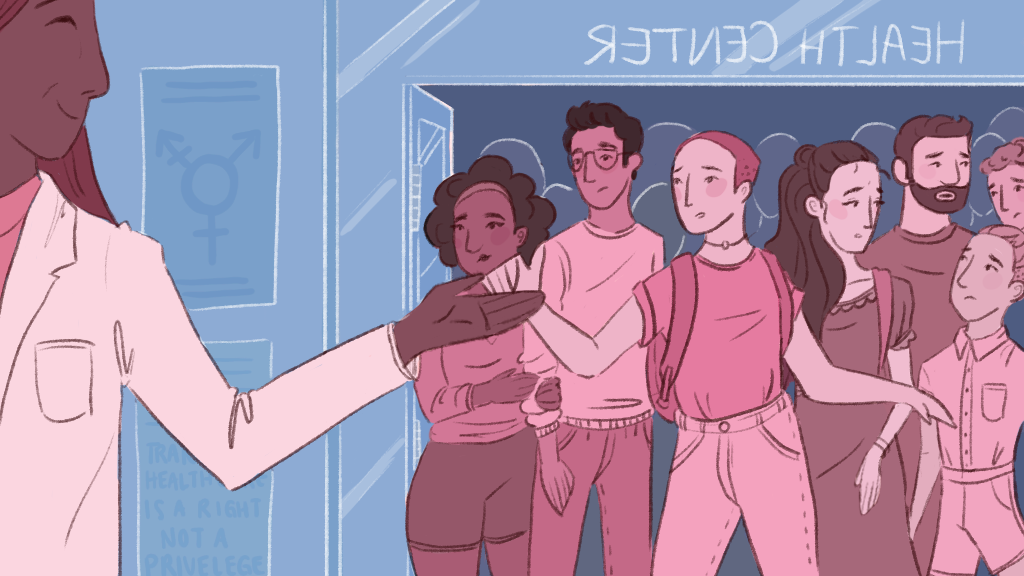Student Efforts to Expand Transgender Healthcare Pay Off
by Tyler English | published Oct. 2nd, 2018
This fall the Student Health Center will offer expanded resources for transgender students. The program has been in the works since last year after students began to advocate for resources that they needed to be available on campus. The addition of programs, such as the ability to prescribe hormones to transgender students and the offer of support groups and individualized therapy, was made possible with the help of the Student Health Center (SHC), administration and the student body.
Better Serving the Community
Dr. Lindsay Phillips, MD, the medical director at the SHC, said that such an expansion of services was directly within her purview upon being hired.
“I was told to look into the services that are needed and what is the best way to meet our students’ needs,” she said.
This desire to better serve the entirety of the RIT community then led to a long process of interviewing students and other institutions to gain expertise on the services that transgender students require.
“From attending conferences and learning more about protocols and medicines and if it is something that I felt was reasonable for the student health service to provide, I began to develop a plan for RIT,” Phillips said.
After extensive research and meetings, Phillips and the SHC were able to develop a transgender care program specifically for the RIT population.
When people first think about transgender health care they typically think about hormones. “RIT is now able to prescribe hormones for individuals to achieve physical characteristics that are more in line with their gender identity,” Phillips said.
Those who require these resources simply have to make an appointment at the SHC and start the process. Students will then be taken through a personalized conversation with a physician to help them in understanding what the treatment consists of.
In addition to the ability to prescribe hormones for students, the SHC now has a trans-care clinic once per month. Each month, a specialist in transgender health care will be available for students to visit. The specialist will be in for two half-days every month. This may not sound like a lot of time, but the new health care options are in the early stages of life and are looking to grow, according to Phillips.
The SHC wants to ensure students have a safe and supportive environment to discuss their gender identity and have access to resources necessary for them. The process is also in the hands of the students, having the ability to direct their care in the ways that will be of the most benefit to them. This would include options to take part in support groups or speak to specialists, in addition to standard care.
Advocacy from the Community
These new programs would not have come about if it weren't for the student voices behind the need.
Ryan Roy, a third year American Sign Language-English Interpreting major, serves as the vice president of OUTspoken. Roy has been a large voice for the transgender community as an advocate for trans-care on campus.
Roy began his campaign in early summer 2018 with a PawPrints petition wherein he detailed why having transgender health care on campus is necessary. The petition, like all others, had a month to accumulate 200 signatures before it would be guaranteed to receive a response.
“It got over 400 signatures and it didn’t even take the full time that it had,” said Roy.
The petition helped to show how many students would be positively impacted from adding transgender health care to campus. Healthcare is not only limited to hormone therapy treatments, but also counseling and support group contacts.
“During the spring semester, they [OUTspoken] ended up having a protest to show that we still have students interested,” said Roy.
The off-campus protest was the students' way of showing how large of a community was affected by the lack of health care options offered by the SHC at the time.
“That was the semester that I decided to run for OUTspoken vice president, because I wanted to have more of a hand in how this was getting dealt with,” said Roy.
At the time, the executive board for OUTspoken did not have any transgender students, so they were lacking the true perspective of the students that would be affected.
Another student who worked closely alongside Roy was Henry Trettenbach, a third year Applied Arts and Sciences major through the School of Individualized Studies with a concentration in humanities. Trettenbach identifies as gender-queer and was deeply involved in the campaign.
“It’s a step in the right direction,” said Trettenbach.
Bringing these options and programs to RIT indicates a conscious attempt to promote the needs of under-served communities, and the tightening of relations with a community who in the past has felt unfairly treated by the administration.
Moving Forward
There are steps being taken by the administration on behalf of the students to ensure that they feel welcomed on campus. Roy said that RIT's faculty and staff will become more accepting as programs like these continue to develop and manifest into a more open dialogue of gender and identity.
Phillips is excited to see where the programs are going to go, and through her leadership she is ready to spread awareness of the new services that are offered at the SHC. Phillips is also willing to look if there are other subsets of students that are in need of specialized services.
Roy and Trettenbach are hopeful that, by continuing the pressure on the administration, further change and progress can be made.
Bringing transgender healthcare to RIT was a massive undertaking by Phillips, Roy and Trettenbach. Not wanting to limit the healthcare to just hormone therapy treatments, Roy and Trettenbach campaigned for expanded resources for the transgender community. Moving forward is about keeping the conversation going and maintaining this momentum to produce further change.




